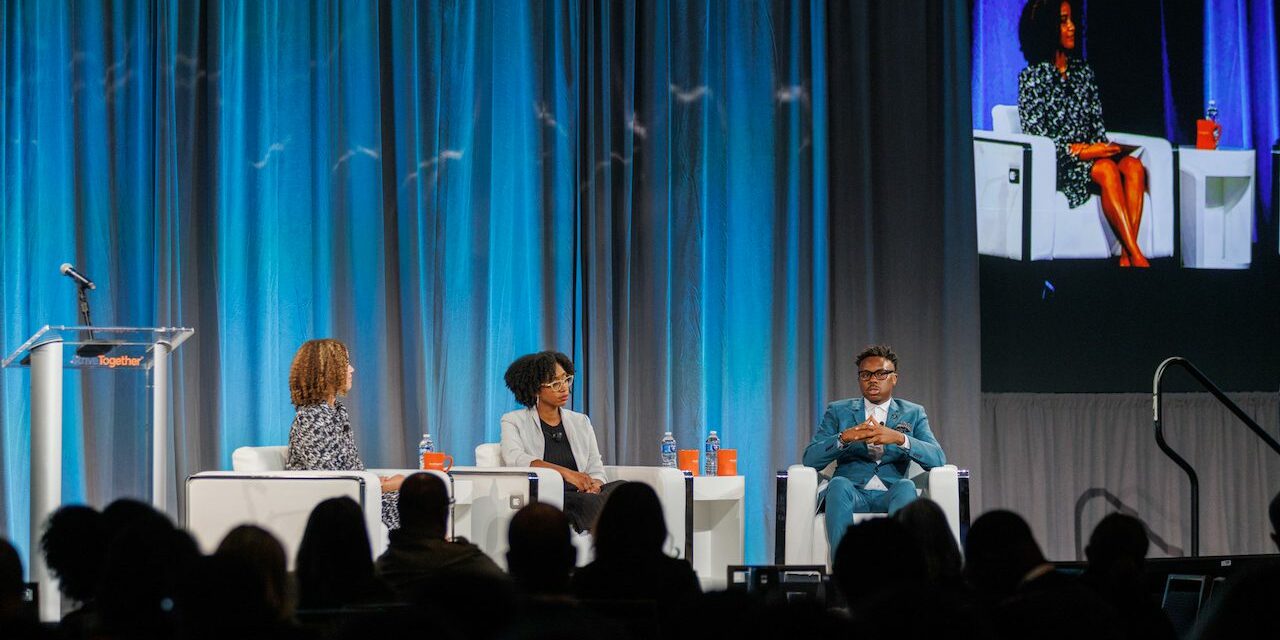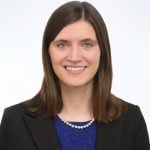“Put young people in a position to lead, and they will make this world a better place,” Jerelyn Rodriguez shared on stage at the 2023 Cradle to Career Network Convening.
Rodriguez, co-founder and CEO of The Knowledge House, joined Dr. Tim Lampkin for a conversation about activating youth leadership to help put more young people on a path to economic mobility.
Rodriguez started The Knowledge House to help young people connect to opportunity in the tech economy through skills training, career support and a network of partners. The organization has grown to serve job seekers in New York, Newark, Atlanta and Los Angeles. She also serves on the leadership council for Cradle to Career Network member South Bronx Rising Together.
Lampkin is founder and CEO of Higher Purpose Co. Higher Purpose Co. is an economic justice nonprofit that builds community wealth with Black business owners across Mississippi. Their work supports the ownership of financial, cultural and political power.
In their conversation, key themes emerged to help guide work to support young leaders.
Listen to young people and adapt in the work.
The first step in activating youth leadership can be simple.
“How do we know what young people want? Go ask them,” Lampkin said. Find them where they are, like at sporting events or gaming tournaments. And then, be prepared to really listen.
“You might not like what they have to say,” he added. Ask them why they haven’t been involved. “A lot of young people don’t know you’re building something for them because they’re not included. You can’t talk about young people if young people aren’t in the room.”
Responding to this feedback and being flexible is a necessity in this work. Once you hear what young people have to say, you may need to shift to respond. “If you’re doing work in the community, then you have to move and evolve with the community,” Lampkin said.
Rodriguez agreed, emphasizing the importance of accepting young people as they are and creating a safe space for them to be, not to be what you want them to be. Young people collaborate and develop partnerships naturally. “Get out of their way,” she said
Offer representational mentorship.
Both speakers shared the importance of representation, role models and mentorships in their journeys and their current work.
Rodriguez co-founded The Knowledge House after witnessing the success of other entrepreneurs — particularly those who looked like her and were her age. “I saw them do it, and I said, ‘I can do that, too,’” she shared. “My leadership centers on replicating success stories for others to benefit and make room for young people to lead.”
Her niece, Raylin, was also an inspiration. “I wanted to give people who look like me the opportunity to produce, to innovate, to create. It is those innovation skills that lead to economic mobility.”
Rodriguez shared that her access to mentorship, especially female mentors of color, became limited as her career evolved.
“More women leaders, young leaders, to be mentors — that’s a need. Because that’s what my students need. When they go into corporate America, they’re not seeing enough people who look like them,” she shared.
In response to this need, Jerelyn said, 80% of The Knowledge House team members are people of color from the same communities as their fellows, and they use strategies like working with employee resource groups to connect young people with mentors that share their identities.
Lampkin’s journey also began with someone to look up to. He shared memories of going to visit his grandparents in Mississippi during childhood summers and seeing the Black-owned business there, including his own grandparents’ business. His work with Higher Purpose Co. aims to recreate those summers and ensure that Black business owners are seen, heard and appreciated. The power of mentorship is key in this work, he said.
“Mentorship doesn’t have to be formal or rigid. It just has to be a commitment,” Lampkin shared.
The commitment also goes both ways. Too often, he said, those being mentored focus on “What can I get out of this?” instead of “What can I pour into someone else?” Instead, the mentorship relationship can support both sides — along with benefiting the communities of each. Through Higher Purpose Co., members support each other as peer-to-peer business mentors. “It’s about the community of business owners rising together every step of the way,” Lampkin said.
Lampkin shared that one thing mentors can do for their mentees is support them to learn through challenges. “I wish someone had created a space for me to fail quickly,” he shared. “It’s not failure, you’re learning. I wish someone would have told me that earlier in my journey, because so many times we put pressure on ourselves as young leaders.”
Support self-care and community care.
Lampkin and Rodriguez ended their conversation emphasizing the importance of taking care of yourself in the work, and supporting young leaders to do so as well.
Rodriguez shared that her organization used to have hustle as a core value, but has since shifted toward self-care. “If other folks are not pouring into you traditionally, you need to take care of yourself. You need to take care of yourself so you can take care of others.”
While this can be a challenge, Lampkin recognized that foundations and other supporters are starting to take note, investing more back into leaders and their well-being. “It is hard for us to lead if we’re not pouring into ourselves,” Lampkin said.
At organizations, they both suggested ways to support staff, including offering generous paid time off and team wellness retreats. At Higher Purpose Co., Lampkin says he starts meetings with personal check-ins and strives to make sure team members feel seen.
And again, representation and mentorship are crucial. When she’s not at The Knowledge House, Rodriguez pursues filmmaking, modeling for her staff that it’s not all about the work and encouraging them to dig into other passions.
Lampkin shared that he prioritizes self-care through therapy, which he is vocal about to his team. This openness “allows people to give themselves permission to go on their own self-care journey,” he said.
These practices enable the two leaders to undertake extraordinary work. Higher Purpose Co. has connected Black business owners in Mississippi with $2 million in capital. The Knowledge House has served more than 2,000 young people to date — and three of four program graduates have secured employment.
Rodriguez and Lampkin see the impacts of their work in the families and communities of the individuals their organizations support. And the young people they work with are positioned to continue and deepen these transformations.
“We know that when we put young people in positions of leadership, they thrive,” Rodriguez said. “And they create systemic change for their communities.”






